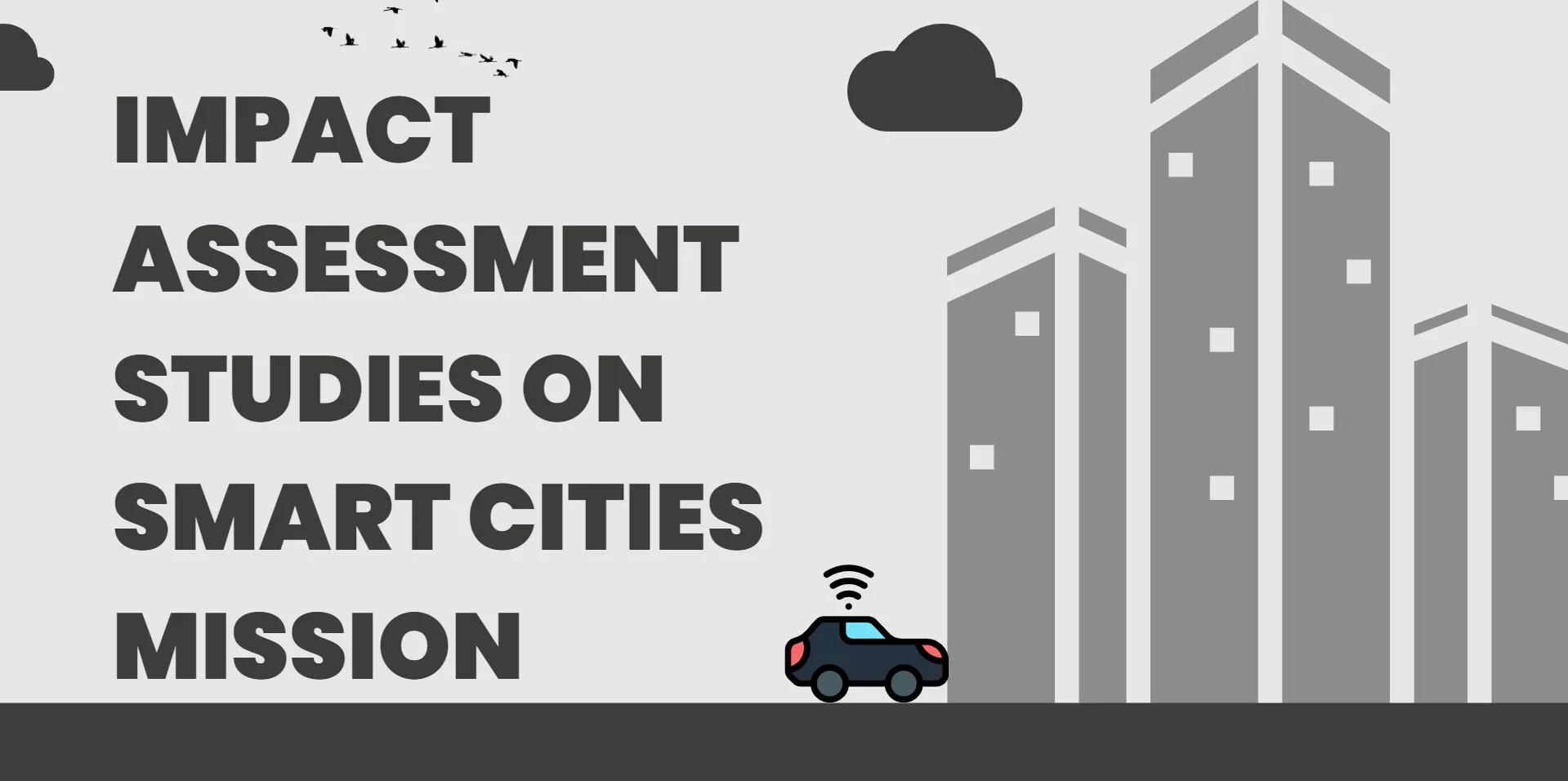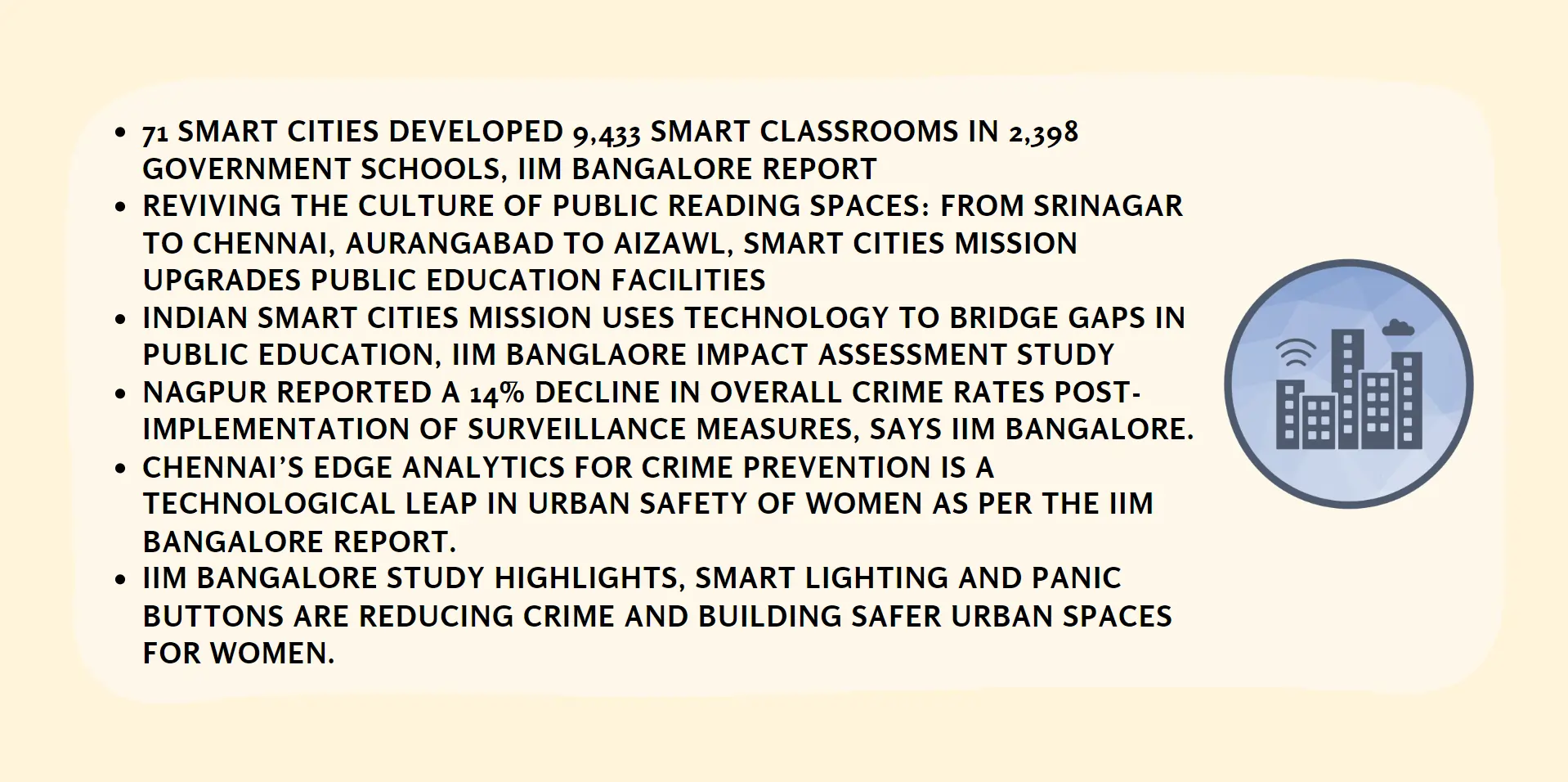
The Smart Cities Mission, launched by the Government of India in the year 2015 was purposed with the objective of stimulating regional economic growth while enhancing the quality of life in cities by area development formalised through technology – with special reference to Smart outcomes. This ambitious scheme is aimed to foster sustainable and inclusive cities that afford its people basic infrastructure for an acceptable standard of living, an environment which is clean and sustainable, integrated use of ‘Smart’ Solutions. Surveys are crucial in the analysis of the outcomes and revealing of the effectiveness of the Smart Cities Program. These studies assist in providing insights on the degree of accomplishment of the goals of the initiative and the level of influence on the constructions, political, economic, and social realities of the urban areas.
Goals and Aims of the Impact Assessment Research
The general purpose of impact assessment studies is to measure the effectiveness of the Smart Cities Mission. These objectives include:
- Evaluating Infrastructure Development: The studies also identify the enhancement of communication networks, water, sewerage, roads, and supply of electricity. They also explain how these improvements have impacted on the quality of the people’s lives, regarding sustainable city development.
- Assessing Technological Integration: Smart Infrastructure is a part of the Smart Cities Mission that focuses on the assimilation of advance technologies in urban planning as well as management. Impact assessment studies relate to smart solutions such as IoT, smart grid and data analysis. They determine the extent to which these technologies enhance urban services as well as governance.
- Measuring Social and Economic Benefits: These studies explain the social and economic implications of smart cities and the job, new businesses, and easier access to services that will be attained when the Smart Cities Mission is implemented. They evaluate the impact of the initiative with regard to the status of social inclusion, and the reduction of inequalities in large cities.
- Evaluating Environmental Sustainability: It is worthy of note that environmental sustainability has received a defining place in the Smart Cities Mission. The number and magnitude of impact assessment studies give an evaluation of measures that have been undertaken towards uptake of green infrastructure, combating carbon traces in the environment and improving the ability of cities to cope with climate change impacts.
The key findings are as follows:
A number of sectional impact assessments have been discussed in order to understand the effectiveness of smart city mission. Key findings from these studies include:
- Infrastructure Improvements: The studies have focused on the enhancements of the urban structure in smart cities and reveal the improvements. For instance, smart water management has emerged i.e. proper supply of water with minimal wastage. New technologies in public transport and specially designed traffic movements have led to a reduction of traffic jam and enhanced mobility within urban centres.
- Technological Advancements: Technology has been taken into some cities and its implication in enhancing the services delivery and management of cities is evident. Effective implementation of Smart technologies in the aspects of street lights, management of wastes, and surveillance have made cities safer and cleaner places to be.
- Economic Growth and Job Creation: Consequent upon the Smart Cities Mission, there has been benefited by enhanced economic development in terms of investment and innovative spirit. Smart infrastructure has been seen to create employment and also stimulate economic growth within regions. The studies have also revealed that smart cities are now proving to be competitive destinations for innovation and for technological enterprises.
- Social Inclusion and Quality of Life: The findings of the impact assessment studies drawn from the implementation of Smart Cities Mission have shown that quality of life has improved in the relevant cities and better access to health, education and shelter among other aspects.
- Environmental Benefits: Some of the studies have revealed the positive environmental effects of the Smart Cities Mission. Projects like green building, renewable energy, and sustainable urban mobility have helped in containing carbon emission and encouraging environmental friendly practice.
Challenges
- Funding and Financial Sustainability: However, the most significant issue with the Smart Cities Mission is to address the problem financing and how the smart cities will be funded sustainably. These cities have funds from the central and state levels governments for starting these projects, but significant funding is necessary to keep them running in the long run. Most cities experience problems with the revenues they receive to support maintenance and development of smart technologies.
- Coordination and Governance: Project coordination and governance are the significant factors in smart city projects to be effectively implemented. Since many actors are often involved in these projects such as different government ministries agencies, private companies, and local people, commitments tend to be uncoordinated and disjointed. The lack of roles and responsibilities could significantly lead to the emergence of a problem-slow start and repeating similar tasks.
- Technological Integration: Implementation of new technologies in a complex and already developed environment presents unique technical and practical difficulties. A considerable number of cities face insufficiency of the digital environment and qualified professionals to integrate smart solutions. Other areas of interest include compatibility where data need to be shared between platforms as well as protection of data that is being transferred.
- Citizen Participation: Citizens’ participation in smart city development is pivotal for the project efficiency. However, a number of smart city initiatives are currently experiencing difficulties in engaging the residents and meeting their needs and wants. Lack of awareness and poor communication also create resistance and worst leads to low public support.
- Environmental Sustainability: Though, the Smart Cities Mission has been attempting for environmental sustainability, it is rather challenging to strike a right balance between the growing urbanization and the protection of environment. Most cities are grappling with how to deal with waste management, ways of cutting down on greenhouse gases emissions and how to best conserve natural resources. Minimizing the negative impact of development of smart city on the environment is an important consideration.
Areas for Improvement
- Innovative Financing Mechanisms: In order to eliminate the funding concerns, the financial sources should be considered are: PPP, municipal bonds, and international grant. Successful smart city undertakings may require more than one source of funding which must be strategically planned for in order to support smarter city plans in the future.
- Strengthening Institutional Frameworks: As for the second problem, enhancing coordination and governance involve the enhancement of first, institutional environment, and second, role definition. Establishment of comprehensive specific smart city agencies bear unique responsibilities for regulating and implementing initiatives can also improve responsibility and decision-making.
- Building Digital Infrastructure and Capacity: High-speed Internet, fibre-data center to be put in place to support the smart technologies. Furthermore, cities have to foster technical knowledge acquisition by personnel and partnership with the technology development companies.
- Enhancing Citizen Engagement: Citizen Participation in the decision making processes need to be encouraged using the downstream governance approach. The authorities of cities can use numerations of mobile applications and propagandistic online pages to receive ratings. Transparent as well as participatory planning can put an effective foundation in constructive project support.
- Promoting Green and Sustainable Solutions: For ecological efficiency, urban centres must adopt environmental technologies, and act in an environmentally friendly manner. Incorporating green buildings, renewable energy, and sustainable mobility systems experiences show that carbon emissions should be cut and resources conserved.
- Monitoring and Evaluation: The follow up and over time analysis of smart city projects are important in evaluating their performance as well as cutting on unnecessary expenditure. Such assessments can be conducted with the help of such method as key performance indicators (KPI) and data analysis may help to evaluate the effectiveness of the proposed initiatives.
Smart Cities Mission: Transforming Urban India
Started by the Government of India in 2015, Smart Cities Mission is the unique initiative that solely focuses on planning of economic development with well-equipped solutions for improving the quality of life across the country with the help of modern technologies. The mission therefore is to foster the development of sustainable and inclusive cities that offer essential community facilities and amenities, a clean and sustainable environment and a reasonable quality of life of occupants of those cities.
The focus areas of the Smart Cities Mission include:
- Infrastructure Development: Improving service delivery and upgrading the physical bases of demand including water, sewages and electrical power.
- Urban Mobility: Reforming the existing and expansion of the public transport system and encouragement of low emission transport to avoid traffic jam and pollution.
- Sustainable Environment: adopting policies such as waste management, projects in renewable energy and green products and structures.
- Smart Technology Integration: Information and communication technology (ICT) innovations as a tool to enhance urbanization, governance and provision of services. This entails smart grid technology, intelligent transport systems and electronic participation of citizens.
- Inclusive Development: promotion of the idea that socially vulnerable groups will also be granted access to achieve results from urban development processes. This includes provision of accommodations, the access to medical and educational services, and the necessary social facilities.
In order to ensure focused and efficient project implementation, operation and maintenance, Special Purpose Vehicles (SPVs), one for each city, have been set up for the Smart Cities Mission. The mission focuses on the public engagement to ensure the public comes up with the necessary input in the planning and development of the area. The Smart Cities Mission intends to upgrade the urban infrastructure into smart, sustainable and resilient to offer a better quality to live, support economic growth besides improving life index of country’s urban populace.
Sameeksha Series of Smart Cities Mission (SCM) Launched in Nov 2023
In November 2023, the Government of India has initiated the Sameeksha Series of Smart Cities Mission (SCM), which is an integrated mechanism of assessment of the Smart Cities Mission in the process of city making. This series requires undertaking 50 national level impact assessment studies on purposive themes by 29 premier institutions of India.
Key Objectives and Themes
The Sameeksha Series focuses on several critical themes, including:
- Quality of Education: Estimating effectiveness of smart classrooms brought into education especially for impoverished children. Many researchers have indicated that they have recorded a 22% increase in overall enrolment due to introduction of smart classrooms enhanced learning.
- Urban Safety: Assessing the utility of real-time tracking system as well as other smart surveillance systems on the aspect of reducing criminal activities with emphasis on crimes against women. Places like Nagpur and Chennai have said to have witnessed drastic reduction of crime rates mainly because of these strategies.
- Digital Libraries: A study of the effectiveness of the available digital libraries on the teaching aids and the preparations for the competitive examinations. The city such as Raipur has established digital libraries with sufficient number of seats that is very useful for students.
- Environmental Sustainability: Discovering how smart cities understand and mitigate climate change and encourage sustainable consumption. These include; green building; renewable energy; sustainable urban transport; and any other initiative that is in line with sustainable development.
Methodology
The Sameeksha Series follows a quite comprehensive approach, including a micro-level study of selected cities and consultation with city officials and organizations. For example, Indian Institute of Management, Bangalore study concludes improvements in Quality of Education through Smart Classrooms.
